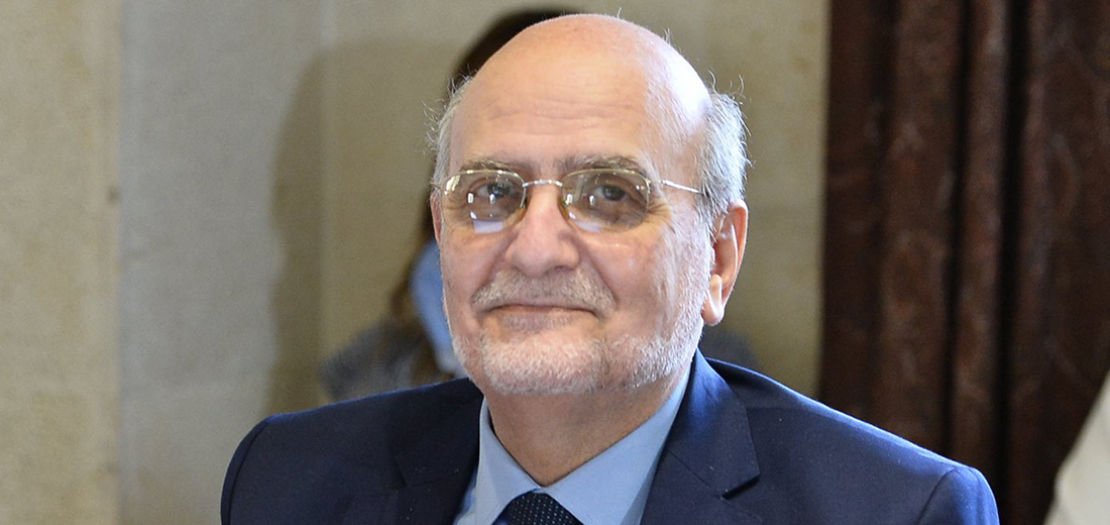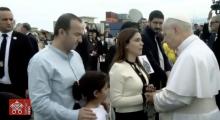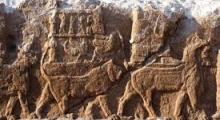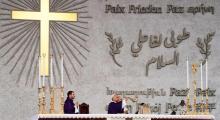Issued by the Catholic Center for Studies and Media - Jordan. Editor-in-chief Fr. Rif'at Bader - موقع أبونا abouna.org

Secretary General of the Middle East Council of Churches (MECC) Professor Michel Abs delivered the following address at the celebration commemorating the 60th anniversary of the document "Nostra Aetate", held on Saturday, November 8, 2025, at the Maronite Patriarchal Edifice in Bkerke, Lebanon:
When, in a blessed time in the history of the Antiochian Levant, a group of visionary men gathered to establish a unifying Christian institution based on ecumenism, the Lord was among them, and Nostra Aetate was present among them through the Holy Spirit, their guide. They produced a vision that later proved to be far-reaching, with long-lasting effects.
In the preamble to the constitution of this dialogical and unifying institution, firstly on the Christian level, they wrote that the goal of the MECC is to deepen spiritual fellowship among the Churches of the Middle East and to unify their word and their efforts, contributing to the work for the unity of the Churches and bearing a living evangelical witness aimed at spreading the message of salvation and reconciliation in the Lord Jesus Christ, love, peace, and justice in the region and among its peoples.
From the beginning, the principles of dialogue and reconciliation were central in the minds of the founding fathers, not only among Christians, but also, explicitly, among the peoples of this region, which has been boiling for centuries and has yet to find any lasting stability.
Later, in outlining the Council’s methods for achieving these declared objectives, expressions were used that dispelled doubt and affirmed conviction—words such as dialogue, fostering the spirit of partnership, ecumenical awareness, understanding of member-church traditions, mutual enrichment, active participation in prayer, cooperation and joint humanitarian service, the pursuit of justice, the defense of human rights, and the strengthening of the Christian presence to ensure steadfastness in freedom, peace, and equality in citizenship, rights, and duties.
The founding visionaries concluded their outline for this promising journey by affirming the development and support of structured dialogue aimed at mutual understanding, in order to strengthen and consolidate peace and harmony among peoples for the good of humanity.
The Middle East Council of Churches has been active in the region for more than half a century, redefining its identity and role in each stage according to the challenges and requirements of the time, engaging dynamically with its environment and its peoples’ aspirations.
The MECC embodies the spirit and aspirations of the ecumenical movement in the cradle of Christianity. Comparing its ecumenical culture and spirit at its inception with that of today demonstrates the Council’s impact on inter-church relations, especially since it is composed of four theological families that interact with trust and love, transcending differences that once caused centuries-long divisions, at times even bloody ones. This has been achieved through dialogue, the very hallmark of the Council’s identity and culture since its foundation.
The Council was established in the Middle Eastern context by the region’s own Churches to serve as a space for inter-church cooperation and to play a leading role in rapprochement at all possible levels. Guided by dialogue rooted in acceptance of diversity—the essence of ecumenism—it evolved into a platform for rapprochement among religions, ethnicities, and other groups. It has thus become a haven of dialogue, interaction, and reconciliation among the peoples of this region, the Antiochian Levant and the Nile Valley.
The Council’s identity also embraces non-Christians in the region. From its early years, it was, by the Churches’ mandate and in their name, the primary interlocutor with Muslims of various denominations. Their leaders have consistently regarded the MECC as an honest and genuine partner who means what he says and embodies his words in action, as will be illustrated later when discussing developmental work.
The same trust exists at the popular level: the MECC has been able to operate safely and with respect in volatile areas across the Middle East, without obstacles or incidents.
This trust and experience led the Council to become a founding member of the Islamic-Christian National Dialogue Committee (ICNDC) and other dialogue initiatives in the Arab region.
The Middle East Council of Churches plays a pioneering role in dialogue and reconciliation, coupling its message of peace with tangible developmental work on multiple fronts.
The MECC was the first to aid displaced Palestinians, establishing five institutions that provide developmental services in their areas of displacement, Beirut, Amman, Nazareth, Jerusalem, and Gaza, all of which continue to serve the Palestinian people today in their daily suffering through diverse developmental support.
It was likewise among the first to assist and rehabilitate the Lebanese people during and after the civil war, offering services across all of Lebanon without exception, services that continue to this day.
The MECC also intervened in relief and development work in Iraq, followed by Syria, where operations remain active today. In Jordan, its development projects reach all sectors of society, and similar initiatives are being prepared in Egypt, with dialogue programs forming an essential component.
In all of these efforts, the MECC has served everyone it could reach among those affected and rendered destitute by wars, without discrimination of any kind, as set forth in the Charter of Relief and Development drafted at the Council’s inception.
Beyond addressing material needs, these relief and development efforts serve as instruments of dialogue and reconciliation, joining word and deed, extending a helping hand to people in their darkest hours.
All of this continues today and has become an integral part of the Council’s culture and mindset across all its church committees and working teams.
Today, beyond its relief and development work, the Council’s initiatives in dialogue and reconciliation fall under three main programs, soon to be housed within a new department dedicated to dialogue, social cohesion, human dignity, values, and social capital:
1. Shared Religious Spaces in the Middle East:
This program began when Lebanon declared the Feast of the Annunciation a national holiday, an initiative of the ICNDC, recognizing Mary’s Annunciation as a shared belief among religions. To mark the occasion last year, we launched the program with a major symposium. It will expand to include other religious sites that have become national symbols, such as the Baptism Site in Jordan, the refuge of the Holy Family in Egypt, and the site of Christ’s appearance to Saul, along with others that have turned into national pilgrimage destinations. The program also includes shared religious activities, such as making Christmas trees by Muslim families or their participation in Palm Sunday celebrations, and, conversely, highlighting Christian scholars who have studied and interpreted Islamic thought out of genuine admiration for its richness.
2. Combating Demonization and Hate Speech:
Following the bombing of St Elias Church in Dweilaa, near Damascus, and the massacres in Syria, some voices began demonizing an entire respected religious community by associating it with extremist groups. In response, we launched a program titled “Combating Demonization and Hate Speech” to prevent this destructive culture from spreading among the peoples of the Middle East, which would inevitably lead to endless internal wars. We presented this project to the Lebanese authorities, who saw its merit and agreed to partner with us. Preparations are now underway.
3. Pioneers in Human Fraternity:
Inspired by the message of Sharif Hussein bin Ali al-Hashemi of Mecca, who instructed Arab troops in northern Syria to protect Armenian and Syriac refugees fleeing massacres at the beginning of the 20th century, we prepared a conference project about this noble and inspiring figure as part of our Pioneers in Human Fraternity program. This project is currently under review in the Hashemite Kingdom of Jordan.
In the same spirit, we are preparing a dialogue program to be launched in the Arab Republic of Egypt, in collaboration with several interfaith Egyptian bodies and, naturally, with the participation of our member churches there.
This is but a glimpse of the Middle East Council of Churches’ ongoing mission of dialogue. Within its institutional culture, dialogue is not merely a means, but a goal in itself.
The concept of ecumenism in the MECC has expanded: once referring only to Christians in all their diversity, it now embraces all people of the world, those for whose sake the Lord was incarnate, for their salvation, and so that they might have life, and have it abundantly.







